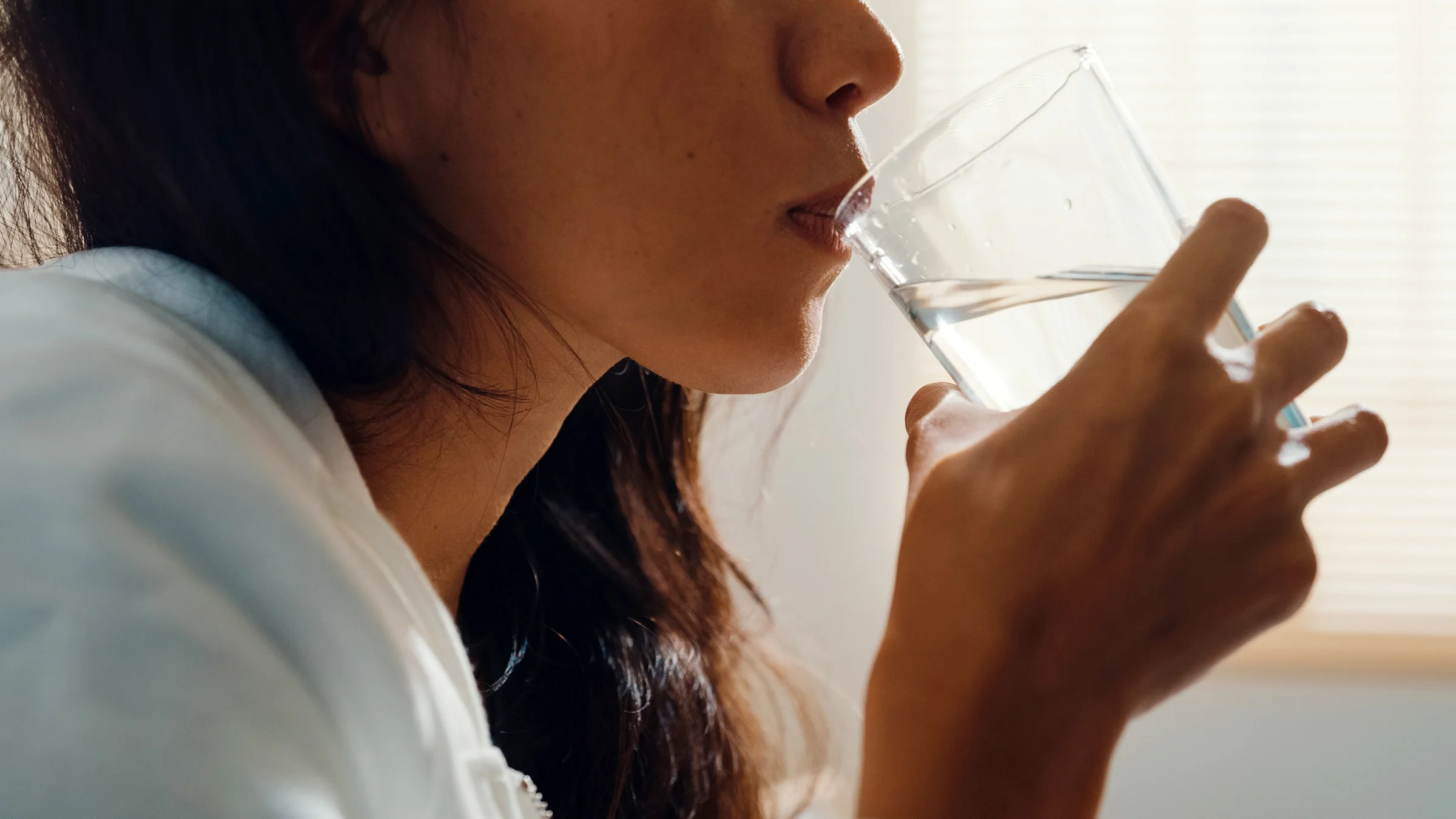Key takeaways:
Diarrhea causes the body to lose fluid and electrolytes, which can lead to dehydration.
The best things to drink for diarrhea include clear liquids and drinks that contain electrolytes.
Some drinks can make diarrhea worse. Avoid caffeine, alcohol, and sugary drinks when you have diarrhea.
Diarrhea is a common experience — even if we don't talk about it a lot. Most people in the U.S. will experience diarrhea at least once a year. And most of the time, diarrhea will get better on their own in a few days. But diarrhea can lead to dehydration because when body loses too much fluid and electrolytes.
Dehydration can make anyone feel tired and run down. But dehydration can be dangerous, especially for older adults and young children. What you drink when you have diarrhea will not only help you feel better, but it can also prevent serious dehydration.
What is the best thing to drink when you have diarrhea?
The average adult should drink about 8 oz of fluids every time they have a loose bowel movement. This helps replace lost fluids and electrolytes so you can avoid dehydration.
Search and compare options
Here are the best things to drink when you have diarrhea.
1. Water
It’s not a huge surprise to see water at the top of this list. Not only is it good for you, but water also replaces lost fluids without added sugar or chemicals.
If you can’t stomach drinking that much water, try sugar-free ice pops. While they do contain dyes and other ingredients, they’re high in water content and can break up the monotony of drinking water.
2. Electrolyte drinks
When you have diarrhea, you lose both water and electrolytes. Premade electrolyte drinks do double duty by replacing both. You can alternate between water and electrolyte drinks, too.
While most adults can get by with water, children and babies should get some electrolytes when they have diarrhea.
“For babies under the age of 6 months, additional water in the diet can cause problems like water intoxication,” said Dr. Jennifer Sample, a pediatrician and GoodRx contributor.
Foods that make diarrhea worse: Here are some foods to avoid when you have diarrhea.
Looking for medications that can ease diarrhea? Take a look at our guide to the best OTC options for diarrhea relief.
When dehydration becomes an emergency: Severe dehydration can lead to problems like kidney damage. Learn the signs that you need to get medical help.
Experts recommend oral rehydration solutions, like Pedialyte, for babies with diarrhea. These oral rehydration solutions are lower in sugar than sports drinks. Many oral rehydration solutions are also available as ice pops.
3. Broth
Store-bought soup broth contains both water and electrolytes. You can opt for chicken, beef, or vegetable broth.
Sipping on broth alone probably won’t be enough to prevent dehydration — not many people can drink that much broth in a day. But it’s another tool you can use to keep yourself hydrated.
- FlagylMetronidazole
- SulfatrimSulfamethoxazole/Trimethoprim
- BactrimSulfamethoxazole/Trimethoprim
If you’re not feeling too nauseous, you can try a lighter soup made with clear broth like chicken noodle soup. This offers you both the benefits of broth and some extra nutrition from the chicken and noodles. Plus it’s easy on your stomach.
4. No-pulp fruit juice
You can also try some fruit juice. But there are a couple of caveats for this one. First, you want a no-pulp juice. And second, you need to water it down. Your drink should be half water and half juice.
For children, you can offer fruit juice as a break from oral rehydration solutions. But don’t rely on it too much. There’s evidence that children who drink too much fruit juice take longer to recover from diarrhea.
5. Ginger tea
Ginger has many beneficial health effects, and there’s some evidence that it can ease diarrhea and upset stomach.
Try adding a cup or two of ginger tea into your day. Not only will you get some extra water, the ginger may also help soothe your gut. Ginger tea is available in grocery stores. You can make your own tea by boiling ginger root in water and then letting it simmer for 5 minutes. Then strain the liquid and sip away!
6. Kefir
Kefir is a fermented milk-based drink that contains probiotics. Probiotics may help support gut health. They can also help replace any good bacteria that gets lost from a diarrheal illness.
Like broth, you won’t be able to stay hydrated just by drinking kefir. But adding a daily drink can help re-establish the good bacteria in your gut, which may help you recover.
What drinks should you avoid when you have diarrhea?
Some drinks can do more harm than good when you’re dealing with diarrhea. Make sure to avoid these four drinks that can increase your risk of becoming dehydrated.
1. Caffeinated drinks
Caffeinated drinks like coffee, tea, soda, and energy drinks can actually increase your risk of developing dehydration. Caffeine actually makes you pee more often, which adds to your overall fluid loss.
2. Alcohol
Like caffeine, alcohol makes you pee more often, increasing your risk of dehydration. But that’s not all. Alcohol can actually make your diarrhea worse because it keeps your large intestine from holding onto water. Alcohol causes direct damage to your gut lining, and this can prolong recovery.
3. Sugary beverages
You may remember a parent or older relative telling you to drink flat sodas — like ginger ale — for upset stomachs and diarrhea. But there is a lack of research to suggest they help. Sodas have too much sugar and not enough electrolytes to help with fluid loss. Plus, beverages that are high in sugar can actually worsen diarrhea. The high sugar load keeps your large intestines from holding onto water.
4. Milk
Some people have trouble digesting milk sugars when they have diarrhea. That’s because inflammation in the gut damages the proteins that break down milk sugars. It can take a while for your body to recover. So if you notice your diarrhea getting worse when you drink milk, stay away from dairy products until you’re fully recovered.
What kind of foods should you eat if you have diarrhea?
You don’t have to restrict your diet if you have diarrhea. It’s safe to eat whatever you normally eat, as long as it doesn’t make your symptoms worse.
But some people find it’s easier to tolerate bland foods when they have diarrhea or an upset stomach. Some foods that may be easier on your stomach include:
Toast
Saltine crackers
Plain potatoes
Plain pasta
Clear soup and broths
Eggs
Cooked cereals, such as cream of wheat or oatmeal
Tofu
Lean meat, such as chicken breast
Bland vegetables, such as cooked spinach or carrots
Tea
When should you get medical care for diarrhea?
Usually, diarrhea clears up in a few days. If you’re still having diarrhea after a week or you think you could be dehydrated, get care as soon as possible
You should get care right away if you develop any of the following symptoms:
Blood in your stool
Black or sticky, tarry stools
Fever
Severe stomach pain
Significant weakness
Fainting
Dark urine, or a significant decrease in urination
Frequently asked questions
It depends on what’s causing your diarrhea. Usually, diarrhea clears up in a few days if it’s caused by a virus or bacteria.
Dehydration doesn’t usually cause diarrhea, except in very severe situations. But diarrhea does cause dehydration. Older adults and children can become dehydrated very quickly if they develop diarrhea.
It depends on what’s causing your diarrhea. Usually, diarrhea clears up in a few days if it’s caused by a virus or bacteria.
Dehydration doesn’t usually cause diarrhea, except in very severe situations. But diarrhea does cause dehydration. Older adults and children can become dehydrated very quickly if they develop diarrhea.
The bottom line
Diarrhea is a common problem. What you drink when you have diarrhea can make you feel better and prevent you from becoming dehydrated. The best things to drink when you have diarrhea are clear liquids (like water), electrolyte drinks, and soup broth. Avoid caffeinated drinks, sugary drinks, and alcohol when you have diarrhea.
Diarrhea usually gets better on its own within a few days. Get medical care if your symptoms last longer than a week or you think you may be dehydrated

Why trust our experts?


References
Aghsaeifard, Z., et al. (2022). Understanding the use of oral rehydration therapy: A narrative review from clinical practice to main recommendations. Health Science Reports.
Bishensari, F., et al. (2017). Alcohol and gut-derived inflammation. Alcohol Research.
Bruce, R. C., et al. (1997). Hyponatremic seizures secondary to oral water intoxication in infancy: Association with commercial bottled drinking water. Pediatrics.
Centre for Gastrointestinal Health. (n.d.). Causes of diarrhea after alcohol.
Ghayur, M. N., et al. (2005). Pharmacological basis for the medicinal use of ginger in gastrointestinal disorders. Digestive Diseases and Sciences.
MacGillivray, S., et al. (2013). Lactose avoidance for young children with acute diarrhoea. Cochrane Database of Systematic Reviews.
Maserejian, N. N., et al. (2013). Intake of caffeinated, carbonated, or citrus beverage types and development of lower urinary tract symptoms in men and women. American Journal of Epidemiology.
MedlinePlus. (2016). Diarrhea.
Mount Sinai. (n.d.). When you have diarrhea.
Valois, S., et al. (2005). Controlled, double-blind, randomized clinical trial to evaluate the impact of fruit juice consumption on the evolution of infants with acute diarrhea. Nutrition Journal.














